Türkmen Terzi
The current political climate in Turkey teeters on a precipice, challenged by Recep Tayyip Erdoğan’s Islamist and autocratic regime. Commentators such as CNN’s Fareed Zakaria have described the recent presidential and parliamentary elections as “free but not fair.” Despite the seemingly unfair advantage, Erdoğan and his ruling Justice and Development Party (AKP), which leverages state institutions and media, lost a significant portion of its votes compared to the 2018 general election. As a result Erdoğan fell short of the necessary votes to avoid a runoff election on May 28.
Turkey’s election authority, the Supreme Election Board (YSK), on Thursday announced the official results of the runoff that confirms Erdoğan’s win, garnering 52.18 percent of the nationwide vote. The presidential election was not just a victory for the AKP or Erdoğan alone. It was regarded as a referendum between Kemalist secularists and a coalition of ultranationalists and Islamists. Despite this dichotomy, Turkey’s military establishment (which can also be referred to as the “Kemalist” deep state) backed the ruling Public Alliance to continue enjoying certain privileges afforded them by Erdoğan’s autocratic rule.
Turkey’s interior minister, Süleyman Soylu, who is rumored to be one of the key figures of the deep state, established a parallel vote-counting system within his ministry to manipulate the election results. Soylu ordered police and gendarmes on duty to collect and record election results despite this being illegal. The minister made a statement prior to the polls saying that “The presidential election will result in around 49.5 percent. We tried very hard, but we couldn’t take it half a point further. The Public Alliance will have 320-325 deputies.”
Of course, Soylu is no soothsayer, but it is clear that he manipulated the election result in favor of the ruling Public Alliance as his estimates were extremely accurate, while most polling companies were off.
While the main opposition Republican People’s Party (CHP) filed complaints over suspected irregularities at thousands of ballot boxes following the May 14 elections, the Workers’ Party of Turkey (TİP) claimed that there were irregularities in around 20,000 ballot boxes and estimated that some 4.2 million votes were affected by these irregularities. Several Turkish media outlets reported inconsistencies between the wet-signed minutes reporting the official tallies and the data reported by the YSK. These inconsistencies were mostly observed in Kurdish-majority provinces. This could mean that Kurdish votes for the opposition Green Left Party were allocated to rival parties, mainly to the far-right Nationalist Movement Party (MHP), an ally of Erdoğan, in a number of Kurdish-majority cities.
Previously, Erdoğan and Turkey’s Kemalist establishment were the fiercest of rivals. Erdoğan served as mayor of İstanbul from 1994 to 1998 under the Welfare Party, founded by Necmettin Erbakan, who was also the founder of the National Outlook (Milli Görüş) movement, a political Islamist organization created in the late 1960s. Erbakan’s Welfare Party won the general election in 1995; however, his government could not withstand the pressure of the Turkish military and resigned in 1997. Subsequently, the party was banned from engaging in politics altogether.
Erdoğan’s AKP was established mainly by National Outlook members in 2000, but Erdoğan said he had removed his “National Outlook [Islamist] shirt,” promising to pursue democratic reform. He implemented reforms during his early years as prime minister. He pushed for European Union membership and resisted meddling by the Turkish military in politics. The AKP supported the police and judiciary during the Ergenekon trials, which took place from 2008 to 2016. Ergenekon is a suspected secularist clandestine organization that purportedly functioned as a deep state in Turkey. The group’s high-profile members allegedly included military officers, bureaucrats and media personalities. They were accused of plotting against the Turkish government.
Erdoğan changed his stance against Ergenekon after the Gezi Park protests in İstanbul in May 2013, which evolved into nationwide protests against his increasingly authoritarian rule. Following the protests, corruption operations in December 2013 targeted his senior ministers and inner circle including his son Bilal Erdoğan.
Faced with these threats to his grip on power, Erdoğan established a sort of power-sharing coalition with the military establishment. With their help, he took control of the judiciary, and in return, the Turkish judiciary acquitted the Ergenekon defendants.
Erdoğan prevailed over the Gezi Park protests as well as managing to cover up the December 17-25 corruption cases. The Ergenekon and Sledgehammer defendants were acquitted by Turkish courts under duress from Erdoğan’s AKP. It was the Kemalist deep state that toppled Erdoğan’s master, Erbakan, and Erdoğan himself was banned for life from politics and jailed for reading a religious poem in 1998. The AKP narrowly escaped being outlawed for violating the country’s secular system in 2008.
Despite all this history Erdoğan, who has always had the support of Turkey’s rural inner Anatolia, struck a deal with Kemalist deep state figures, who were especially influential in the army, media and other key institutions, agreed to cover up their crimes and share power in Turkey.
However, as Erdoğan’s health is deteriorating, it is plausible that Turkey’s deep state may keep him in his 1,150-room palace and run the country with those who are loyal to them from among the AKP ranks such as Süleyman Soylu and Turkey’s nationalist kingmaker, Sinan Oğan, who endorsed Erdoğan in the presidential race.


